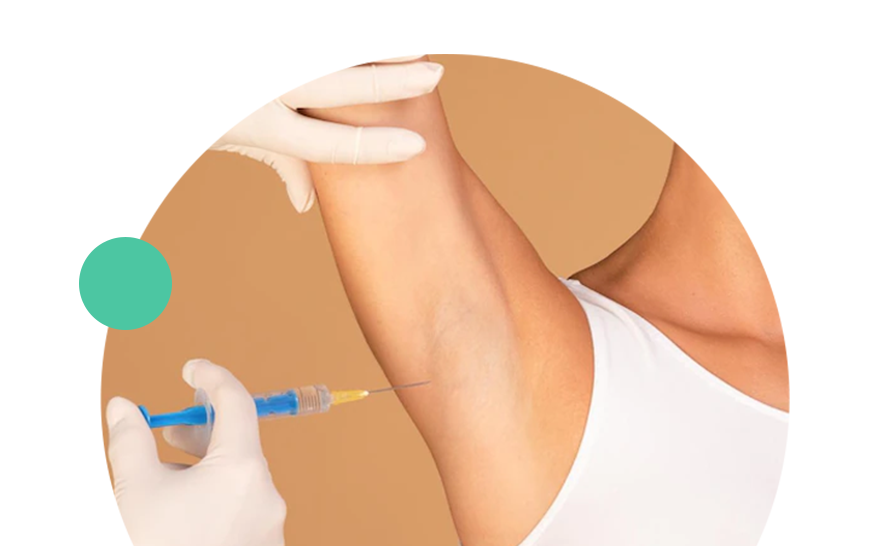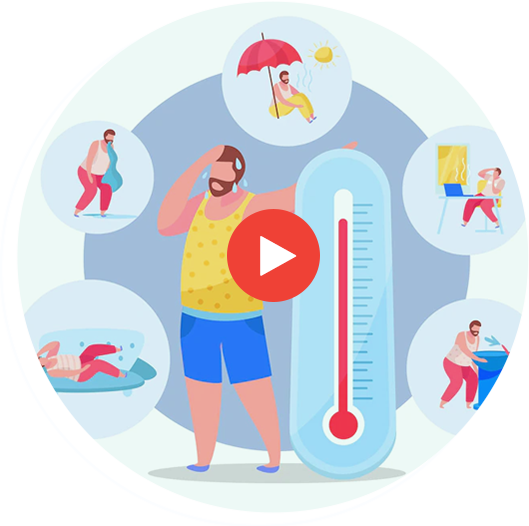

Many times, something as simple as wearing loose clothing can bring relief from the discomfort caused by hyperhidrosis/excessive sweating. However, since the condition can be seriously uncomfortable and embarrassing at work, it’s important to understand how this condition affects your life and how can an online doctor for hyperhidrosis help you.
TELMDCARE
What is
Excessive Sweating?
Did you know that excessive sweating of palms, soles, facial lesions, or the axillae area can be a sign of hyperhidrosis? Hyperhidrosis is a common condition in men and women in which your body can’t manage sweat production effectively, affecting your health, appearance, and general well-being.
According to the National Institutes of Health, approximately 36 percent of adults over 21 have hyperhidrosis — that's more than one-third! It is commonly seen in people who use their hands excessively, like artists, groomers, salespersons, etc. The sweating can be so intense that they feel perpetually wet and are unable to avoid getting hand marks during the day. Excessive sweating can also lead to dampness, odors, stains on clothing and sheets, etc.
Book an Appointment for Only
TELMDCARE
Is covered by many popular
insurance plans

TELMDCARE
Factors Affecting The Condition
Hyperhidrosis is caused by several different factors. These include:
If you notice any of the symptoms listed above, it’s important to consult an online dermatologist for skin infection treatment online.
Who is at risk for
excessive sweating?
Anyone who has a medical condition that affects the body's ability to regulate its temperature can be at risk for excessive sweating.
How does one get diagnosed
with Excessive Sweating?
First, take your temperature every morning for three days in a row, then take your body temperature at night for three days in a row.
TELMDCARE
How Is Hyperhidrosis Diagnosed?
Hyperhidrosis is a medical condition that causes sweating that occurs uncontrollably, often on the face, hands, and feet.
Hyperhidrosis can be extremely embarrassing, interfering with normal activities and relationships. In some cases, it can lead to social isolation and depression.
Hyperhidrosis is usually not caused by an infection or disease but rather by a disorder of the autonomic nervous system (ANS). The ANS controls involuntary functions such as heart rate, digestion, and breathing. Hyperhidrosis occurs when the ANS becomes overactive in response to stress or psychological factors.
When hyperhidrosis is caused by an underlying medical condition such as kidney disease, diabetes, or endocrine disorders, then treatment will depend on the underlying cause.
However, if you have excessive sweating but do not have any other symptoms or signs of a serious underlying medical condition, your online doctor may diagnose hyperhidrosis on your symptoms alone.
Hyperhidrosis can also be diagnosed during a physical examination by looking at your hands and feet to see if they are sweaty or wet.
TELMDCARE
As Seen On


TELMEDCARE
What we treat
We treat a variety of acute and chronic conditions and provide expert medical advice and guidance for our patients.
Read More
TELMDCARE
What Are The Symptoms
Of Hyperhidrosis?
Symptoms of hyperhidrosis can vary, depending on the type of sweat gland and the area of your body affected by hyperhidrosis.
Most people with hyperhidrosis report the following:

It may also be accompanied by a strong desire for sweets, greasy foods, alcohol, or tobacco products. So, if you notice any of the symptoms listed above, it’s important to get excessive sweating treatment online from a reliable online doctor for hyperhidrosis immediately.
Medication services available 24/7 for adults and kids (3+)
Top quality, board-certified doctors
No insurance needed
Same-day prescriptions available*
*Prescriptions provided at doctor’s discretion.
TELMDCARE
Causes of Hyperhidrosis
Sweating is a normal body function that can be triggered by certain conditions. Here’s a list of some of the most common causes of excessive sweating:
Psychological
Anxiety, stress, depression, and other psychological conditions like Parkinson's disease are all associated with excessive sweating.
Hormonal
Hormonal imbalances may cause perspiration, but they don't always cause hyperhidrosis. However, if you have a hormonal imbalance and your sweat glands appear larger than usual, you might experience excessive sweating. Hormones such as estrogen and testosterone can cause hyperhidrosis (excessive sweating) in some people. Similarly, low thyroid hormone levels and low adrenal gland functioning can also lead to hyperhidrosis.
Medications
Certain medications can also cause excessive sweating, including anticholinergics, painkillers, certain antidepressants, beta-blockers, birth control pills, and blood pressure medication, especially if they are overused or misused.
Surgical conditions:
If you have a surgical condition that causes excessive sweating, your online doctor may recommend excessive sweating treatment options to help manage your condition. It is also possible to have hyperhidrosis due to an infection or another medical condition. This includes several types of skin disorders, such as seborrheic dermatitis (a type of eczema) and psoriasis, among others. In some cases, hyperhidrosis may be caused by an underlying disorder like diabetes.


TELMDCARE
Excessive Sweating
Treatment Options
If you have a skin infection, your online doctor for skin infection may recommend one of the following treatments:
Heat Therapy
Heat therapy is a good way to help reduce excessive sweating. The type of heat depends on your condition and your personal preferences.
Topical Treatments
Topical treatments, such as creams or ointments containing antiperspirants, may also be used to treat hyperhidrosis. These types of products typically contain aluminum chloride hexahydrate, which works by blocking the sweat glands in the underarm area from secreting sweat. It's important to note that these products may cause irritation and stinging if you apply them too often. You should apply them only when you're going out in public or if you're working under pressure.
Botox Injections
Botox injections are another option for treating excessive sweating, but they are not recommended by online doctors for hyperhidrosis for people with severe cases because they can cause side effects such as drooping eyelids and weakness in the facial muscles. Botox injections can, however, help manage severe symptoms of sweating (such as profuse sweating during sleep). Botox injections can also be used in combination with other treatments (such as oral anticholinergics) to provide long-term relief from excessive sweating.
Medications
Oral anticholinergics, topical anticholinergics, and beta-blockers are all available prescription medications that can reduce sweating. However, they may not be effective if the condition is caused by a medical condition such as diabetes or Parkinson's disease.
Surgery
Surgery may be recommended for patients with severe hyperhidrosis symptoms that interfere with their daily activities as a last resort. This procedure involves removing part of the sympathetic nerve fibers in your body's sweat glands — which significantly reduces excessive sweating.

Let TelMDCare’sOnline Doctors For Hyperhidrosis
Help You Out
If you’re looking for excessive sweating treatment online, the doctors at TelMDCare can help manage your condition with minimum time and effort on your part.
We are an established and reputable virtual healthcare service provider offering our valued patients affordable healthcare solutions starting at just $43. Our staff works around the clock to give you the best treatment choices, including laser therapy, botox injections, and chemical peels for mild cases and surgical procedures for severe cases. Therefore, there is no better choice than TelMDCare's virtual doctors for hyperhidrosis if you need professional assistance.
Sign up today to make an appointment with one of our general physicians, who are trained in the medical area. Get in touch with us today!
TELMDCARE
Sign Up
Sign up and book an appointment with our specialists to get sweatiness treatment online today!
$43 SIGN UP
TELMDCARE
FAQs For Hyperhidrosis
If you have hyperhidrosis, your sweat glands are overactive, which means that more sweat is produced than is needed for normal function. The sweat glands may be located in different areas of the body and can be affected by stress and anxiety.
The most common symptoms to look out for include excessive sweating. The sweating may also be accompanied by redness or irritation around the area where you perspire, as well as a strong odor from your sweat glands. In severe cases of hyperhidrosis, there may be excessive fluid buildup under the skin and visible bulging under clothing.
Other symptoms include:
Here are some effective ways to prevent excessive sweating:
Hyperhidrosis can be embarrassing and make you feel self-conscious about your sweatiness, but it doesn't pose any kind of danger to your health.



